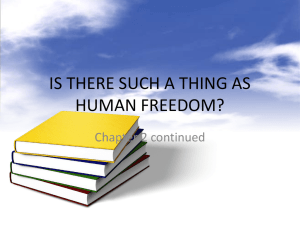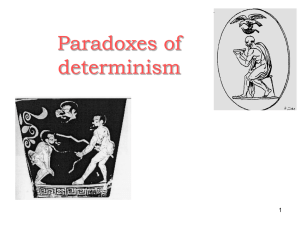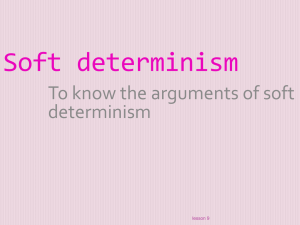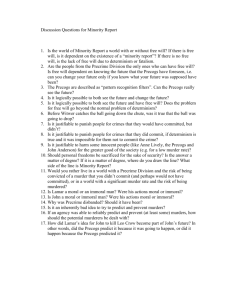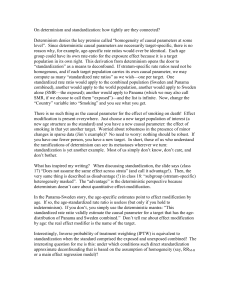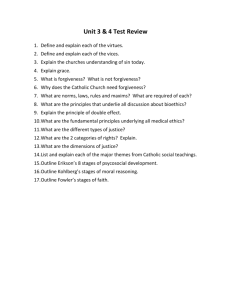Useful notes on Free Will and determinsim File
advertisement
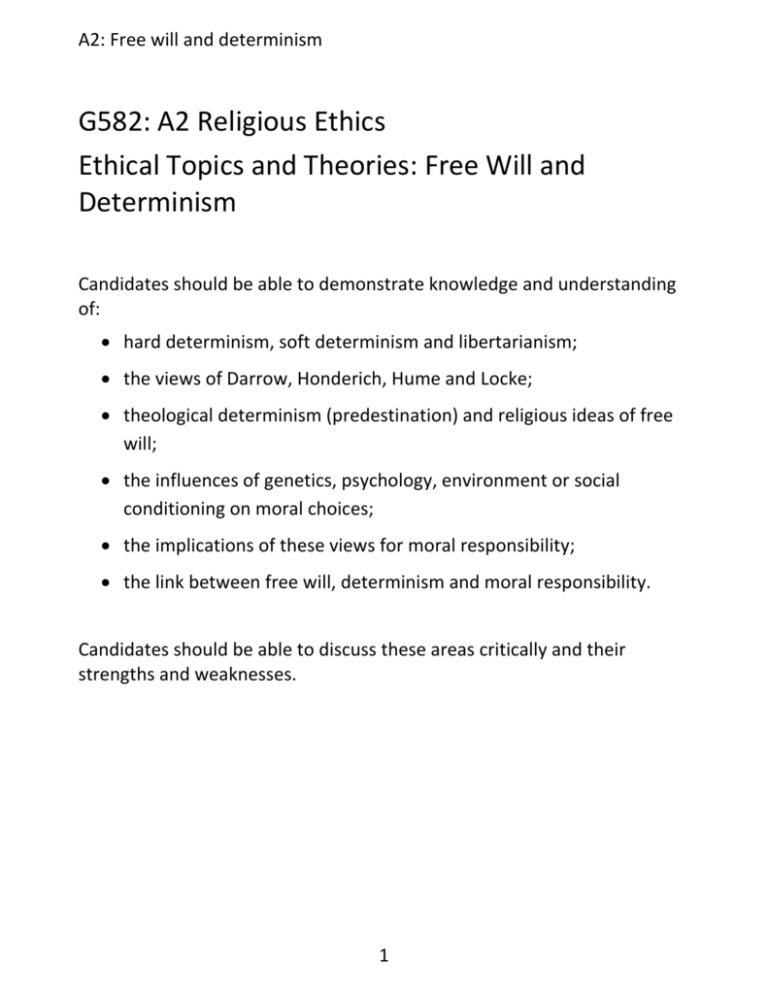
A2: Free will and determinism G582: A2 Religious Ethics Ethical Topics and Theories: Free Will and Determinism Candidates should be able to demonstrate knowledge and understanding of: hard determinism, soft determinism and libertarianism; the views of Darrow, Honderich, Hume and Locke; theological determinism (predestination) and religious ideas of free will; the influences of genetics, psychology, environment or social conditioning on moral choices; the implications of these views for moral responsibility; the link between free will, determinism and moral responsibility. Candidates should be able to discuss these areas critically and their strengths and weaknesses. 1 A2: Free will and determinism Candidates should be able to demonstrate knowledge and understanding of hard determinism, soft determinism and libertarianism Hard determinism (the strongest version of determinism) Key claim: all events/actions are determined by prior events/actions (this is determinism). This includes choices – so there is no free will. Hard determinism is a version of incompatibilism (free will is incompatible with determinism) Both these claims cannot be true: o We have free will o The universe is a deterministic system Hard determinists deny we have free will Our sense of free will is an illusion Our mental states (beliefs, desires etc) are caused by events that happened before we were born, therefore we did not choose them The theory is based upon a mechanistic world view - developed by scientists such as Newton o Humans are like machines - we have no free will o There is absolutely no room for free will o Puppet analogy Ted Honderich o There is no free will o "All our choice, decision, intentions and other mental events and our actions are nothing more than effects of equally necessitated events" Spinoza o "In the mind there is no absolute for free will; but the mind is determined to wish this or that by a cause, which has also been determined by another cause and so on to infinity" o (or back to the Big Bang) John Hospers o We want to believe that we have free will - sometimes we think that our choices are free - but they are not Strengths Classical Science tells us the universe is a deterministic system 2 A2: Free will and determinism Criticisms Quantum Physics states that the universe is not deterministic at all levels Human behaviour is unpredictable No moral responsibility! We would just be robots o We would just be robots Phenomenological argument: it does feel as though we make choices through deliberation - that there is more than one option available to us Soft determinism (also called Compatibilism) Soft determinism is the view that the following two claims are logically compatible: o We have free will o The universe is a deterministic system Soft determinism attempts to combine both Determinism and Libertarianism o The universe is determined AND we have freedom/moral responsibility Compatibilists define free will as ‘being able to act upon your causally determined desires’. Having free will is being able to act the way you want. o Schopenhauer "Man can do what he wills but he cannot will what he wills" o Hobbes A person's freedom consists in his finding “no stop, in doing what he has the will, desire, or inclination to do” (Leviathan, p.108). o James Rachels "Whether your behaviour is free just depends on how it was caused. Your act is free if it is caused by your own desires rather than being caused by a mental disease or by someone forcing you or tricking you or the like." o John Locke The Locked Room example We are free to move around in the room - but not to leave the room. Absolute free will is an illusion - there are limits We are not free to choose our desires (volitions) but we are free to choose how to act given our desires. "Liberty is not an idea belonging to volition (desires) ... but to the person having the power of doing ... according as the mind shall choose or direct." 3 A2: Free will and determinism o David Hume Free will is "a power of acting or of not acting, according to the determination of the will." Free actions are caused by the agent’s desires. The Garden of Forking Paths model Having free will requires it to be the case that if things had been different, one could have done different. Strengths Respects both causal determinism and the idea we have free will. Criticisms Is this the correct theory of free will? o Libertarians argue that having free will means being able to choose what we want, not simply being free to do what we choose. Can we choose what to desire? o Being able to choose desires is necessary for free will Libertarianism Libertarianism is a version of incompatibilism (free will is incompatible with determinism) Both these claims cannot be true: o We have free will o The universe is a deterministic system Libertarians deny the universe is deterministic Created as a response to the fact that Hard Determinism rules out the possibility of moral responsibility o Cause and effect not relevant for human choices and behaviour o We have freedom to act, and we are morally responsible for our actions There are examples of people who have changed the course of their lives - this requires free will Strengths Phenomenological argument: it feels as though we do have free will o When we are making a decision, we choose which course of action to follow - we 'weigh up the options' This leads to moral responsibility It intuitively feels as though we are free agents - not robots Quantum Physics states that the universe is not deterministic at all levels Human behaviour is unpredictable 4 A2: Free will and determinism Criticisms JJC Smart's argument against libertarianism o (1) Either determinism is true, or indeterminism is true o (2) If determinism is true, then our choices are not free This is what hard determinism says o (3) If indeterminism is true, then our choices are random, and are not caused by freewill o (Conclusion) Therefore we do not possess freewill If the universe is not deterministic, then this is due to the existence of randomness o Free will does not exist if our 'choices' are simply random Classical Science tells us the universe is a deterministic system The control problem: without causation, our 'free choices' are not under our control - so they are not genuine actions Leibniz's Principle of Sufficient Reason: There must be an adequate (sufficient) reason for any event o What is the reason for mental states? Our desires are often CAUSED by things outside our control - e.g. media, friends, DNA 5 A2: Free will and determinism Candidates should be able to demonstrate knowledge and understanding of the views of Darrow, (Honderich, Hume and Locke – see above) Darrow An American lawyer who defended Loeb and Leopold on the basis that who we are is dependent upon: o Heredity o Social environment And since we are in control of neither of these, we are not responsible for our actions. Darrow: ‘What has this boy to do with it? He was not his own father; he was not his own mother; he was not his own grandparents. All of this was handed to him. He did not surround himself with governesses and wealth. He did not make himself. And yet he is to be compelled to pay.’ The Darrow case o Loeb - unhealthy attitude to crime No belief in obeying societal norms Upbringing involved governesses/personal staff/tutor Rebellion was a natural reaction to this Loeb was not responsible for his actions Very intelligent Studied philosophy at university Nietzschean ideals Aspired to be one of the ubermensch o Leopold Leopold admired Loeb hugely Acted out of love for Loeb So not in control of his own actions o The boys are being punished for the faults of their parents/upbringing They are not morally responsible for their crime They were unable to make a choice between right and wrong They did not feel they were criminally liable They wanted to commit the 'perfect' crime Against Darrow The boys were old enough to shoulder moral/legal responsibility The boys were psychologically 'normal' o So they should have been aware of right and wrong They planned their murder for a long time indicating choice and deliberation 6 A2: Free will and determinism Candidates should be able to demonstrate knowledge and understanding of theological determinism (predestination) and religious ideas of free will Theological determinism (predestination) Hard theological determinism o Paradox of Freewill: God’s omniscience is incompatible with our having freewill. o God determined the future of the universe before Creation (predeterminism). Soft theological determinism o God knows our choices and actions (due to his omniscience). o This foreknowledge does not rule out our freely choosing and acting. Predestination o St Paul: Romans 8. o Augustine: ‘The potter has authority over the clay from the same lump to make one vessel for honour and another for contempt.’ o John Calvin: Humans only use free will to sin. Humans are incapable of doing good. However, we retain moral responsibility for doing wrong because our evil actions are our actions. o God has already chosen those humans to be saved. Whether we go to Heaven or Hell has already been decided. Religious ideas of freewill Aquinas: humans have freewill: ‘man chooses not of necessity but freely’ Essay plan! ‘If God knows the ethical decisions we will make, then we cannot be blamed for doing wrong.’ Discuss. [35] **Introduction** 1. Define omniscience = all knowing (central Christian belief) 2. Introduce the free will paradox – if God knows my choices then are they free choices? 3. Support with Maimonides quotation: "Does God know or does He not know that a certain individual will be good or bad? If thou sayest 'He knows', then it necessarily follows that [that] man is compelled to act as God knew beforehand he would act, otherwise God's knowledge would be imperfect.…" 7 A2: Free will and determinism **Argument: God does know what ethical decisions we will make** 4. Define Theological determinism God determined all future states of the universe at Creation (events then unfold like clockwork). 5. Support with Bible quotation (Jeremiah 1): "Before I formed you in the womb I knew you, before you were born I set you apart; I appointed you as a prophet to the nations." 6. Make connection with the illusion of free will (Locke). **Argument: Therefore we have no moral responsibility** 7. Analyse the link between determinism and moral responsibility. Argument: i. We have no free will ii. If we do not have free will, then we have no moral responsibility iii. If we have no moral responsibility, then we cannot be blamed for doing wrong iv. Conclusion: therefore we cannot be blamed for doing wrong 8. Analyse Predestination: the conclusion of theological determinism is that it is also already determined who will go to Heaven/Hell. (Augustine) 9. Support with St Paul (Romans 9): “Thou wilt say then unto me, Why doth he yet find fault? For who hath resisted his will? Nay but, O man, who art thou that repliest against God? Shall the thing formed say to him that formed it, Why hast thou made me thus? Hath not the potter power over the clay, of the same lump to make one vessel unto honour, and another unto dishonour? What if God, willing to shew his wrath, and to make his power known, endured with much long suffering the vessels of wrath fitted to destruction: And that he might make known the riches of his glory on the vessels of mercy, which he had afore prepared unto glory.” 10. Link back to free will paradox 11. Conclude: So if theological determinism is true we have no free will, and yet we are still rewarded/punished. 8 A2: Free will and determinism **Argument: This is a plausible Christian view** 12. Link to Calvin – humans are intrinsically bad (enslaved to sin) (inclined to go against God’s will). (Thesis of Total Depravity) 13. Support with Bible (Genesis 6): "The LORD saw that the wickedness of man was great in the earth, and that every intention of the thoughts of his heart was only evil continually." 14. Good only happens if God acts in the world (through humans). Because God is full of grace, he has determined some to be saved (the elect) – not because they are good (all humans are full of sin), but simply because he is gracious) **Argument: God’s omniscience does not rule out free will** 15. Explain theological ideas about Free will: not all Christians believe that God’s omniscience rules out free will. 16. Illustrate with Aquinas: humans have freewill: ‘man chooses not of necessity but freely’ 17. Support with Bible (Joshua 24): 18. "But if serving the LORD seems undesirable to you, then choose for yourselves this day whom you will serve, whether the gods your ancestors served beyond the Euphrates, or the gods of the Amorites, in whose land you are living. But as for me and my household, we will serve the LORD." 19. Link with Christian beliefs about eschatological reward/punishment: those who choose well are rewarded with Heaven, those that choose badly are punished with Hell. **Conclusion: without free will, Christianity is incoherent** 20. Link back to question in title 21. Argue that omniscience is correct (as a Christian view) 22. Conclude God allows us to make our own choices 23. Justify this with the idea that salvation offered by JC only makes sense if we have free choice 24. Support with Bible (John 3:16) "For God so loved the world that He gave His only begotten Son, that whoever believes in Him should not perish but have everlasting life." 25. Explain the flaw with the ‘agree with the question’ position (lack of justice) 26. Conclude that free choice entails moral responsibility: that God’s omniscience doesn’t entail that he controls us (knowing that I will do x is not the same as causing me to do x). 27. Justify this with the conception of God as just. 9 A2: Free will and determinism Candidates should be able to demonstrate knowledge and understanding of the influences of genetics, psychology, environment or social conditioning on moral choices Genetics Genetic determinism: the range of our behaviour (thoughts and actions) is determined by our genetic make-up – and made specific by our upbringing (nurture). Steven Pinker: moral reasoning is a result of human biological evolution. If true, then it offers the possibility to genetically screen future paedophiles and rapists. Perhaps immorality could be cured through gene therapy. Psychology Psychological behaviourism: we can predict behaviour (and hence choices) because human behaviour is determined by prior events (e.g., upbringing). Pavlov’s dogs: behaviour can be modified B.F. Skinner: human behaviour can be controlled through rewards and punishments Freud: our choices are determined by what happened during our childhood. Environmental Conditioning Environmental determinism: our behaviour is determined by geography and climate. Hot tropical climates result in lazy behaviour Temperate climates result in a good work ethic Social conditioning Social determinism: our behaviour is determined by society. 10 A2: Free will and determinism Candidates should be able to demonstrate knowledge and understanding of the implications of these views for moral responsibility Genetics I am no more responsible for my moral choices as I am for my shoe size Psychology Our moral choices are out of our control – blame my parents if I do something wrong. Environmental Conditioning Blame my environment for my immoral choices. Social conditioning Blame society for my immoral choices. Candidates should be able to demonstrate knowledge and understanding of the link between free will, determinism and moral responsibility Determinism Premise 1 We have moral responsibility only if we have free will Premise 2 We do not have free will Conclusion Therefore we do not have moral responsibility Libertarianism Premise 1 We have moral responsibility only if we have free will Premise 2 We have free will Conclusion Therefore we have moral responsibility Compatibilism Premise 1 We have moral responsibility only if we have free will Premise 2 We have free will Conclusion Therefore we have moral responsibility 11 A2: Free will and determinism Moral luck When a moral agent is morally blamed or praised for an action or its consequences even though it is clear that said agent did not have full control over either the action or its consequences. This term was introduced by Bernard Williams, and has been developed, by Thomas Nagel. Responsibility and voluntary action seem to go together so that someone is morally blamed if both: The action was performed voluntarily (ie was the result of free choice) The agent understood the consequences of the action (within the limits of reasonableness) We tend not to assign blame if: The agent was coerced The action was an accident The agent had no way of knowing what the consequences could be. Thomas Nagel “Prior to reflection it is intuitively plausible that people cannot be morally assessed for what is not their fault, or for what is due to factors beyond their control” The Control Principle: We are morally assessable only to the extent that what we are assessed for depends on factors under our control. 12
